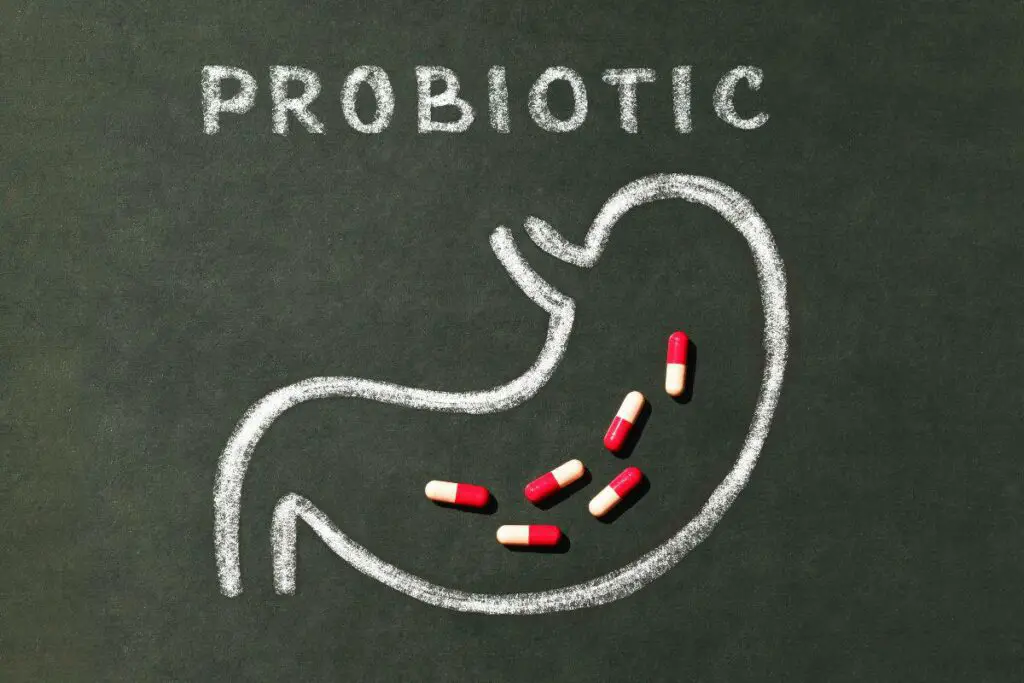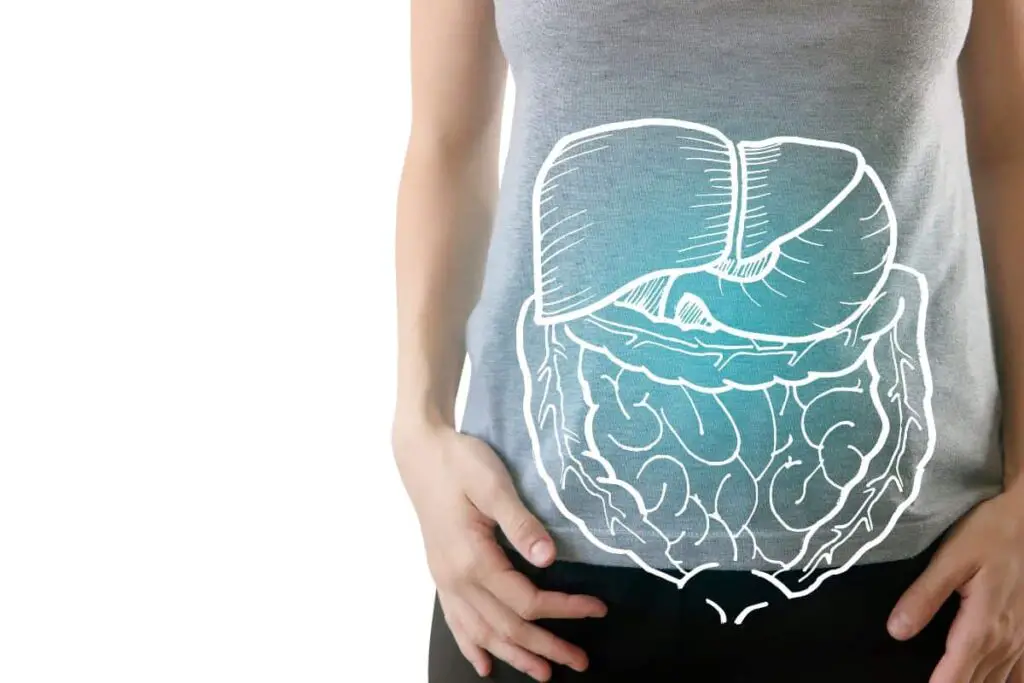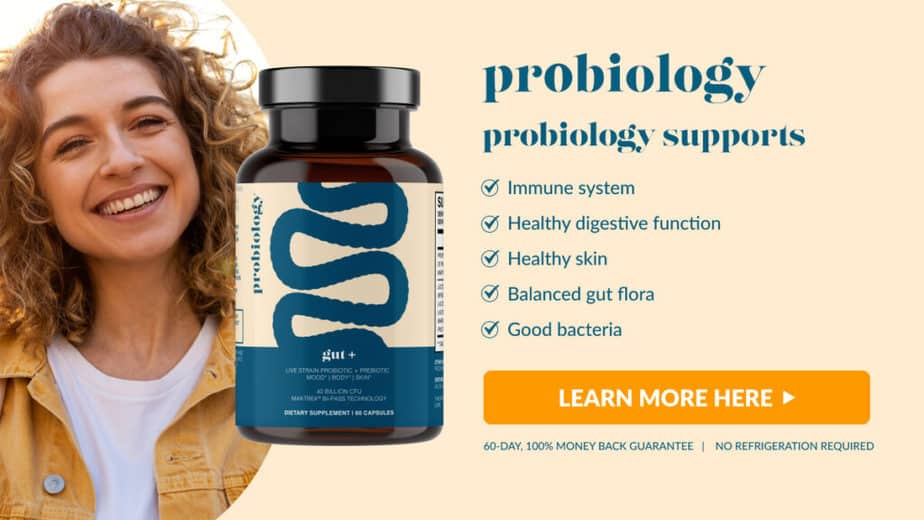Have you ever wondered just what are probiotics and how they can benefit your health? These tiny microorganisms have a big impact on your well-being.
Imagine a bustling city within your gut, with trillions of bacteria working together to keep you healthy. That’s the world of probiotics—a fascinating field of microbiology that’s gaining attention in the world of health and wellness.
In this article, we’ll dive into the basics of probiotics, exploring their definition, types, and how they differ from prebiotics and synbiotics. We’ll then journey into the science behind probiotics, uncovering how they interact with your gut microbiota, digestive system, and even your immune function.
From there, we’ll unlock the many faces of probiotics, examining their potential uses in clinical medicine, various medical specialties, and even mental health.
Whether you’re a health enthusiast, a medical professional, or someone looking for natural ways to support your overall gut health, this article has something for you.
Get ready to unravel the benefits of probiotics, learn how to choose the right ones for you, and discover the exciting future of this rapidly evolving field.

Understanding Probiotics – Key Takeaways
- Probiotics are live microorganisms, usually bacteria, that offer health benefits when consumed in adequate amounts.
- Probiotics are not to be confused with prebiotics, which are non-digestible fibers that serve as food for these microorganisms.
- Synbiotics are a combination of probiotics and prebiotics, offering a one-two punch of beneficial bacteria and nourishment.
- Probiotics like Lactobacillus and Bifidobacterium can support digestion, nutrient absorption, and boost the immune system.
- Probiotics have been studied for their role in various health conditions, from diarrhea to IBS and allergies.
- Probiotics offer unique benefits across different life stages, from reducing colic in infants to supporting digestive health in seniors.
- When choosing a probiotic, look for strain specificity, third-party testing, and consider factors like dosage and storage. Always consult with a healthcare professional.
The Basics: What Are Probiotics?
Probiotics are the unsung heroes of the gut, tiny microorganisms that play a big role in our health. But what exactly are they?
- Defining Probiotics: Probiotics are live microorganisms, usually bacteria, that offer health benefits when consumed in adequate amounts. These beneficial bacteria are derived from the field of microbiology, the study of microorganisms.
- Not to Be Confused with Prebiotics: While probiotics are live microorganisms, prebiotics are non-digestible fibers that serve as food for these microorganisms. Think of prebiotics as the fuel that helps probiotics thrive in your gut.
- The Difference from Synbiotics: Synbiotics, on the other hand, are a combination of probiotics and prebiotics. They offer a one-two punch of beneficial bacteria and the nourishment they need to flourish.
- Common Bacterial Strains: Probiotics often contain strains of bacteria like Lactobacillus and Bifidobacterium. These are the friendly bacteria that can help restore balance to your gut microbiome.
Why are probiotics important? They have been shown to provide a range of health benefits, from supporting digestion and nutrient absorption to boosting the immune system. Incorporating probiotic-rich foods or supplements into your routine can be a simple way to give your gut a helping hand.
The Science Behind Probiotics: How Do They Work?
Probiotics aren’t just a gut feeling; they’re backed by science. These friendly bacteria and yeasts have a profound impact on your gut health, thanks to their intricate interactions with your gut microbiota, digestive system, and even your immune system.
Here’s a closer look at the mechanisms through which probiotics work their magic:
- Gut Microbiota Balancing Act: Your gut is home to trillions of microorganisms, collectively known as the gut microbiota. Probiotics can help maintain a healthy balance of these microorganisms, ensuring that the “good” bacteria outnumber the potentially harmful ones. This balance is crucial for optimal digestive function and overall well-being.
- Digestive System Support: Probiotics aid in the breakdown and absorption of nutrients, making them an essential part of your digestive process. They produce enzymes that help break down complex carbohydrates, proteins, and fats, making them more easily digestible.
- Immune System Boost: Did you know that around 70% of your immune system resides in your gut? Probiotics interact with immune cells in your gut, helping to regulate the immune response and promote a healthy immune system. They can also help prevent harmful bacteria from colonizing in your gut, acting as a protective shield.
- Impact on Health Conditions: Probiotics have been studied extensively for their role in various health conditions. From reducing the severity and duration of diarrhea to alleviating symptoms of irritable bowel syndrome (IBS) and even preventing certain allergies, the benefits are far-reaching.
- Maintaining a Healthy Gut: Your gut is like a finely tuned machine, and probiotics are the oil that keeps it running smoothly. By promoting a diverse and balanced gut microbiota, probiotics help maintain a healthy gut environment, reducing the risk of digestive disorders and promoting overall well-being.
It’s important to note that not all probiotics are created equal. Different strains have different mechanisms of action and benefits for human health.
When choosing a probiotic supplement or probiotic food, look for specific strains that have been studied for the condition you’re targeting. As always, consult with a healthcare professional before starting any new supplement regimen.
The Many Faces of Probiotics: Their Uses and Applications
Probiotics aren’t just for digestive disorders in the human body; these little warriors have a wide array of potential applications across various medical specialties. From clinical medicine to dermatology, their benefits are far-reaching.
Let’s take a look at the diverse conditions probiotics may lend a helping hand:
- Digestive Disorders: Probiotics have shown promise in managing gastrointestinal conditions like IBS, inflammatory bowel disease (IBD), and antibiotic -associated diarrhea. The strains Lactobacillus rhamnosus GG and Saccharomyces boulardii have been particularly studied in these contexts.
- Non-Digestive Conditions: Surprisingly, probiotics have also demonstrated potential in non-digestive conditions such as allergies, dermatitis, and even mental health disorders. The Lactobacillus rhamnosus strain has been associated with reduced eczema in infants, while Bifidobacterium longum has shown promise in alleviating symptoms of anxiety and depression.
- Allergies and Immunity: The gut is intimately linked to our immune system, and probiotics can help bolster our defenses. Certain strains, including Lactobacillus acidophilus and Bifidobacterium lactis, have been studied for their ability to prevent allergies and enhance overall immunity.
The Gut-Brain Axis: A Promising Frontier
The gut-brain axis is an emerging area of research that explores the intricate connection between our gut and mental health. Probiotics, by modulating the gut microbiota, may influence brain function and mood. It’s a fascinating concept that’s gaining traction in the field of psychiatry.
The Evidence: Where Do We Stand?
While the potential of probiotics is exciting, it’s important to note that not all strains are the same. Different strains have different effects, and the evidence isn’t always conclusive. That said, some strains have shown consistent promise in clinical trials.
For example, the Lactobacillus and Bifidobacterium genera are among the most studied and have demonstrated positive outcomes in various conditions. Lactobacillus rhamnosus GG, Lactobacillus casei, and Bifidobacterium infantis have all shown potential in managing digestive disorders.

From Babies to Seniors: Probiotics for Different Life Stages
Probiotics aren’t just a one-size-fits-all solution; they offer unique benefits across the lifespan of our body systems.
In pediatrics, these friendly bacteria can be a game-changer, helping to reduce colic, improve digestion, and even bolster the immune system. As we age, probiotics continue to play a vital role, aiding in disease prevention and supporting overall health.
In Pediatrics: Building a Foundation for Health
- Reducing colic: Probiotics have been shown to alleviate the symptoms of colic in infants, offering relief to both babies and exhausted parents.
- Boosting the immune system: Early exposure to beneficial bacteria can help shape a child’s immune system, potentially reducing the risk of allergies and infections later in life.
- Supporting digestion: Probiotics can help establish a healthy gut microbiome in babies, which is crucial for optimal digestion and nutrient absorption.
In Aging: Nurturing a Resilient Gut
- Preventing age-related digestive issues: As we get older, our digestive system can become more delicate. Probiotics may help prevent common issues like constipation, diarrhea, and indigestion.
- Supporting overall health: A healthy gut is linked to a strong immune system, improved cognitive function, and even better mood. Probiotics can be an essential tool in maintaining vitality as we age.
- Disease prevention: Some research suggests that probiotics may play a role in reducing the risk of chronic diseases that become more prevalent with age, such as heart disease and certain cancers.
Whether you’re a parent looking to soothe a colicky baby or a senior hoping to maintain digestive health, probiotics offer a natural and accessible way to support your well-being.
The key is to choose the right strains and doses, even in healthy people. It’s still important to consider the safety of probiotics for your own body, so consult with a healthcare professional to determine the best approach for you or your loved ones.
Unraveling the Benefits: What Do Probiotics Actually Do?
Probiotics have been riding a wave of popularity lately, and for good reason. These friendly bacteria have a myriad of health benefits, some of which are just starting to be understood. Let’s take a closer look at what they can do for you.
- Promoting Gut Health and Easing Digestive Woes
- Probiotics have long been known to help with common gastrointestinal issues like diarrhea, constipation, and IBS. They work by restoring the balance of bacteria in the gut and strengthening the intestinal barrier.
- Enhancing Nutrient Absorption and Vitamin D Production
- The gut and digestive tract are where all the action happens when it comes to nutrient absorption. Probiotics can help break down food and make it easier for your body to extract essential vitamins and minerals. Some strains even produce vitamin D, a nutrient many of us are deficient in.
- Lowering Cholesterol Levels
- Recent studies have shown that certain probiotic strains can help reduce LDL cholesterol levels, the “bad” cholesterol that can contribute to heart disease.
- Aiding in Weight Management
- While not a magic weight loss pill, probiotics may play a role in maintaining a healthy weight. They can influence the way your body absorbs and stores fat, and some strains have been linked to a lower risk of obesity.
- The Lesser-Known Benefits: From Mental Health to Immune Support
- Probiotics are not just for your gut; they may also benefit your brain. The emerging field of psychobiotics explores the link between gut health and mental well-being, suggesting that probiotics could help alleviate symptoms of anxiety and depression.
- Additionally, probiotics can give your immune system a boost, potentially reducing the risk of infections and allergies.
It’s important to note that while the research on probiotics is promising, there’s still much we don’t know. The benefits can vary depending on the strain, dosage, and individual. So, if you’re considering adding probiotics to your routine, it’s always a good idea to consult with a healthcare professional.
How to Choose the Right Probiotics
When it comes to choosing the right probiotic for you, there are a few key factors to consider. Remember, not all probiotics are created equal, and selecting the right one can make all the difference.
Factors to Consider
Here’s a handy checklist to help you navigate the probiotic aisle:
- Strain Specificity: Different strains of probiotic bacteria offer different benefits. Look for a product that targets your specific health needs. For example, Lactobacillus rhamnosus GG is known for its gut health benefits, while Bifidobacterium bifidum may help with immune support.
- Third-Party Testing: To ensure quality and safety, opt for brands that conduct third-party testing. This extra step can provide peace of mind that what’s on the label is actually in the product.
- Dosage, Storage, and Expiration Dates: Check the recommended dosage and make sure it aligns with your needs. Also, pay attention to storage instructions; some probiotics require refrigeration. Lastly, note the expiration date to ensure you’re getting the most potent product.
Probiotic Supplements vs. Natural Food Sources
While natural food sources like yogurt and sauerkraut offer some probiotic benefits, they may not provide the same level of strain specificity or potency as a probiotic dietary supplement. Supplements are specially formulated to deliver a higher concentration of beneficial bacteria compared to food ingredients.
Understanding Strain Specificity
Let’s dive into strain specificity a bit more. Each strain of bacteria has a unique set of characteristics and benefits. For example, Lactobacillus acidophilus may support digestion, while Bifidobacterium lactis could help with immune function.
When choosing a probiotic, look for strains that align with your specific health goals. For example, the best probiotics for IBS may be different from ones for general overall health.
Practical Tips for Choosing Probiotic Products
Majority are products are oral probiotics in the form of liquid or pill probiotics.
- Opt for liquid probiotics if you have trouble swallowing pills.
- If you’re on the go, consider probiotic pills that are easier to take with you.
- Read labels carefully, checking for strain specificity, potency, and any additional ingredients.
- When in doubt, consult with a healthcare professional who can help guide you based on your individual health needs.
The right probiotic can be a game-changer for your gut health. By considering factors like strain specificity, third-party testing, and storage instructions, you can make an informed choice that best suits your needs.
Remember, it’s not just about the label; it’s about finding the right strains to support your unique gut ecosystem.
Are Probiotics Safe for Everyone?
Probiotics are generally considered safe for most people, but it’s important to exercise caution, especially if you fall into certain categories. Here’s what you need to know:
Potential Side Effects and Precautions
- While rare, some individuals may experience gas, bloating, or an upset stomach when they first start taking probiotics. These symptoms usually subside on their own as your body adjusts.
- If you have a compromised immune system due to a chronic illness or are undergoing immunosuppressive therapy, talk to your healthcare provider before starting a probiotic.
- In extremely rare cases, people with weakened immune systems have developed serious infections from certain strains of probiotics. This is why it’s crucial to seek medical advice if you have an immune-compromising condition.
Probiotics for Specific Populations
- Infants: Some strains of probiotics have been shown to be beneficial for infants, particularly those born via C-section or at higher risk of certain conditions. However, always consult with your pediatrician before giving a probiotic to your baby.
- Pre-term infants: The FDA has noted potential risks of using unapproved probiotic products in preterm and premature infants in hospital settings due to associated severe and possibly fatal adverse effects, including invasive disease and infections.
- Pregnant Women: Probiotics can be a helpful addition during pregnancy, but again, it’s best to consult with your OB-GYN to ensure the specific strains and dosages are safe for you.
- The Elderly: Probiotics can offer benefits to older adults, such as improved digestion and immune function. However, certain strains may interact with medications, so it’s essential to consult with a healthcare professional.
Regulation and Reading Labels
- The U.S. Food and Drug Administration (FDA) classifies probiotics as dietary supplements, meaning they aren’t subject to the same rigorous testing and regulation as medications. However, reputable manufacturers often voluntarily adhere to certain quality standards.
- When reading labels, look for specific strain information and colony-forming units (CFUs). Claims like “boosts immunity” or “improves gut health” may be more marketing hype than scientific fact.
Probiotics can be a valuable addition to your health routine, but it’s always a good idea to consult with your health care provider, especially if you have any underlying health conditions or are taking medications that could interact. By taking these precautions, you can safely unlock the beneficial effects of these gut superheroes.
Integrating Probiotics into Your Lifestyle

If you’re looking to supercharge your self-care routine, adding probiotics to the mix is a no-brainer. These beneficial bacteria not only support your gut health but also play a role in nutrition and health promotion.
Here’s how you can seamlessly incorporate them into your daily life:
- Timing Is Key: When and How to Take Probiotics
- For maximum benefit, take your probiotics consistently. Whether it’s first thing in the morning or before bed, find a routine that works for you.
- While some probiotics are best taken on an empty stomach, others are more effective when paired with a meal. Always check the label or consult a healthcare professional to determine the optimal timing for your specific probiotic.
- To Eat or Not to Eat: Should You Take Probiotics with Food?
- It depends on the probiotic strain. Some are more resilient and can be taken with or without food. Others are more delicate and may require a buffer from stomach acid, which can be provided by a small snack.
- As a general rule, water-soluble probiotics are more versatile and can be taken with or without food, while oil-based or delayed-release capsules often benefit from being taken with a meal.
- Food as Your Probiotic Source: A Guide to Fermented Foods
- If you prefer a food-first approach, fermented foods are a delicious way to get your daily dose of probiotics. Think yogurt, kefir, sauerkraut, kimchi, and kombucha.
- Each fermented food offers a unique probiotic profile, so aim for variety. For example, yogurt typically contains Lactobacillus and Bifidobacterium strains, while kimchi and sauerkraut offer Lactobacillus plantarum and Leuconostoc mesenteroides.
- Note that not all store-bought fermented foods are created equal. Look for those that are unpasteurized and have live and active cultures.
- A Holistic Approach to Health: Probiotics as Part of the Bigger Picture
- While probiotics are a valuable addition to your routine, they work best when combined with a healthy diet and lifestyle.
- Prioritize a diverse, plant-based diet rich in prebiotic fibers, which serve as food for your probiotics.
- Get moving! Regular exercise has been shown to positively influence gut health and the diversity of your gut microbiota.
- Manage stress levels. Chronic stress can disrupt the delicate balance of your gut bacteria, so find stress-reducing activities that work for you.
- Personalized Recommendations: Consult a Healthcare Professional
- Everyone’s gut is unique, so it’s always a good idea to consult with a healthcare professional, such as a registered dietitian or gastroenterologist, for personalized probiotic recommendations.
- This is especially important if you have a health condition or are taking medications that may interact with probiotics.
The Future of Probiotics: Exciting Research and Possibilities
The world of probiotics is expanding beyond our wildest dreams. Researchers are now using advanced techniques like metagenomics to unravel the intricate relationship between our gut and overall health. The implications? Personalized probiotic therapies tailored to an individual’s unique microbiome composition.
Why is this exciting? Well, imagine a future in which you can take a probiotic supplement specifically designed to address your health needs, backed by solid scientific evidence. It’s not just a far-fetched idea; it’s on the horizon.
But it doesn’t stop there. Probiotics are even being explored as potential tools in disease prevention. The COVID-19 pandemic has shed light on the importance of a robust immune system, and recent research suggests that certain probiotic strains might offer protective benefits.
Some probiotic strains can modulate intestinal microbiota and immune response and may be used for cancer prevention or as an adjunct in anticancer chemotherapy.
According to B.R. Golding and S.L. Gorbach, there is “a relationship between a diet enriched with Lactobacillus and a reduction in the incidence of colorectal cancer (by 37% compared to controls)”
Animal model studies have also shown promising results indicating that probiotics can inhibit the development of colon cancer in rats or mice injected with carcinogenic substances. For example, the treatment of Bacillus polyfermenticus, Bifidobacterium, and Lactobacillus strains significantly inhibited the development of colon cancer.
So, what’s next? Novel delivery systems are being explored to ensure probiotics reach their intended targets in the gut. From encapsulated probiotics to probiotic-laden foods, the possibilities are vast.
The future lies in finding the most effective and convenient ways to deliver probiotics. This will maximize their benefits and make them more accessible to everyone.
Probiotic research is helping to shape the future of medicine. From personalized therapies to disease prevention and innovative delivery methods, the potential is immense.
What are Probiotics Final Thoughts
Probiotics, the guardians of gastrointestinal wellness, have emerged as pivotal players in the complex symphony of gut health. These live microorganisms, particularly strains like Lactobacillus and Bifidobacterium, are instrumental in orchestrating a harmonious balance within our gut microbiota.
Their influence extends beyond aiding digestion and absorption, as they also enhance immune defenses and show promise in mitigating a spectrum of health conditions.
With their diverse applications spanning from infancy to the golden years, probiotics adapt to the evolving needs of our bodies, offering tailored support that can alleviate infantile colic, fortify the immune systems of the young, and nurture the delicate digestive systems of the elderly.
As we navigate the vast ecosystem of gut health, the selection of probiotic strains tailored to individual health objectives underscores the importance of precision in optimizing our microbiome. The conscientious choice of these microbial supplements, guided by professional advice, paves the way for a personalized approach to well-being.
Embracing probiotics in our daily regimen is more than a health trend; it’s a commitment to fostering an internal environment where beneficial bacteria can thrive, thus enhancing our overall quality of life. As we continue to unravel the intricacies of the gut-brain axis and the far-reaching impact of these microscopic allies, probiotics stand as a testament to the profound connection between our inner microbial world and our holistic health.

Sources
- https://wicworks.fns.usda.gov/resources/probiotics
- https://www.nccih.nih.gov/health/probiotics-what-you-need-to-know
- https://pubmed.ncbi.nlm.nih.gov/29023420/
- https://pubmed.ncbi.nlm.nih.gov/24290962/
- https://pubmed.ncbi.nlm.nih.gov/18181719/
- https://www.fda.gov/news-events/press-announcements/fda-raises-concerns-about-probiotic-products-sold-use-hospitalized-preterm-infants
- https://www.fda.gov/files/food/published/Draft-Guidance-for-Industry–Policy-Regarding-Quantitative-Labeling-of-Dietary-Supplements-Containing-Live-Microbials-PDF.pdf
- https://www.ncbi.nlm.nih.gov/pmc/articles/PMC7793079/
- https://www.ncbi.nlm.nih.gov/pmc/articles/PMC1479485/

